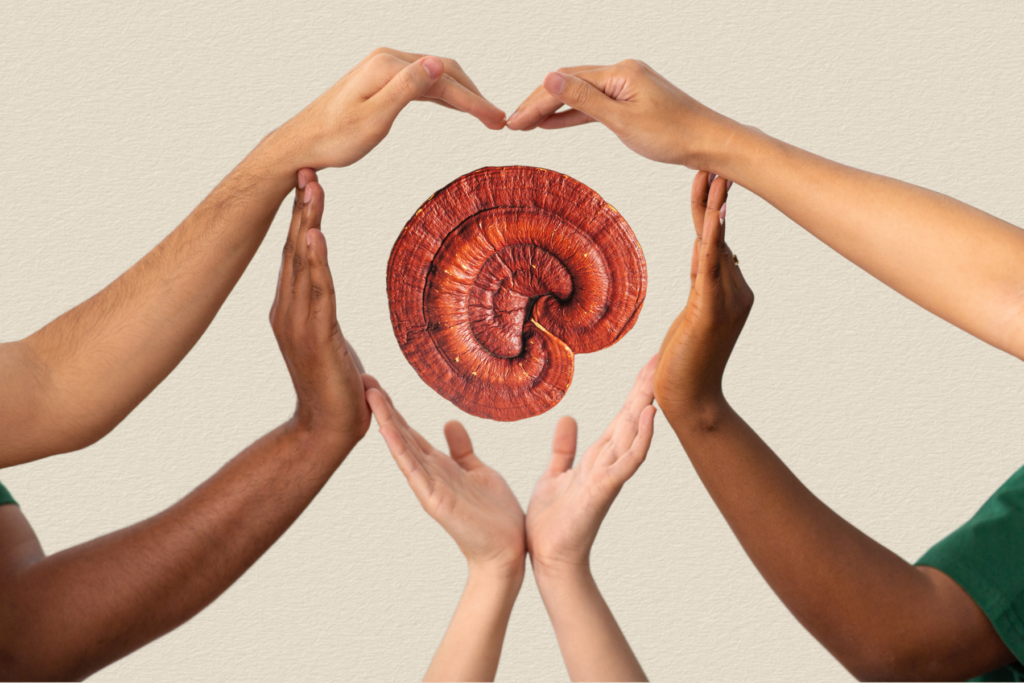Breathe in, breathe out. We often forget the crucial role our lungs play in keeping us strong, healthy, and alive. These vital organs will not only take in oxygen and release carbon dioxide, but also protect against pollutants, irritants, and other harmful organisms. But when you are dealing with a lung infection or the aftereffects of one, breathing can be a struggle.
Whether you have a chronic lung condition or are dealing with temporary chest congestion, there are safe natural remedies to turn to. Read on to learn how reishi can improve lung health and help you recover from respiratory illness.
What is a lung infection?
A lung infection can be caused by a virus, bacteria, and even a fungus. Two common forms of lung infections are bronchitis and pneumonia, though the most notorious ones now are COVID-19 and its variants. A person can become infected by breathing in droplets from a nearby infected person, especially when they sneeze or cough. It can also be contracted by touching surfaces with the contaminant and then touching your own mouth, nose, or eyes.
There are several symptoms associated with lung infections, including a chesty cough, wheezing, shortness of breath, chest discomfort, fever, headache, fatigue, runny nose, and body aches.
Most lung infections are mild, but if you suffer from a compromised immune system or have a chronic condition, infection can be serious. You may also be at an increased risk of developing a respiratory infection if you are elderly, pregnant, or smoke.
How to recover after a lung infection
Depending on the severity of the lung infection and the strength of your body, it can take from one week to several months to recover. A month after pneumonia, for example, your chest should feel better with less mucus, but you may still be fatigued a few months later, and you may not feel back to normal until the sixth month, sometimes longer.
Breathing exercises like active cycle breathing techniques, Buteyko breathing techniques, and glossopharyngeal breathing may be helpful, depending on your situation. Make sure you drink plenty of fluids to loosen up phlegm, making it easier to cough up. You might also try a humidifier (though make sure you clean it regularly), particularly if your home is dry. Try sleeping or resting with extra pillows so you are not lying flat. This can help make breathing easier by preventing mucus from settling in your chest. And, it should go without saying, avoid irritants like smoking or being around second-hand smoke or other airborne irritants.
Try Japanese Red Reishi
Depending on the severity of the lung infection, recovery time can be extensive. It is important to know which treatments—both pharmaceutical and natural—are effective to regain optimal lung health as your body recuperates. That’s where Japanese red reishi can help.
Reishi has been used for generations to support lung health during recovery. Traditional Chinese Medicine texts have long recommended it for strengthening the lungs, eliminating phlegm, and stopping coughing and wheezing. Unlike most Chinese herbs, this one is even recommended to take as a stand-alone herb. Additionally, it can bolster the immune function and calm the mind, which is very helpful when a prolonged illness can leave you drained and stressed out.
Studies have also demonstrated that reishi (Ganoderma lucidum) can help reduce pulmonary fibrosis (damage and scarring of lung tissue) and acute lung injury/acute respiratory distress syndrome (ARDS).
Did you know that reishi is also thought to be a natural antihistamine? As an “immunomodulator,” this medicinal herb is well known for its immune balancing and adaptogenic properties, helping the body manage the body’s response to respiratory irritants like dust, pollen, pet hair, and other inhaled potential allergens.
While time is certainly part of the healing process, you can take steps to speed up your recovery, hopefully in time for you to get back to all your usual activities soon.





